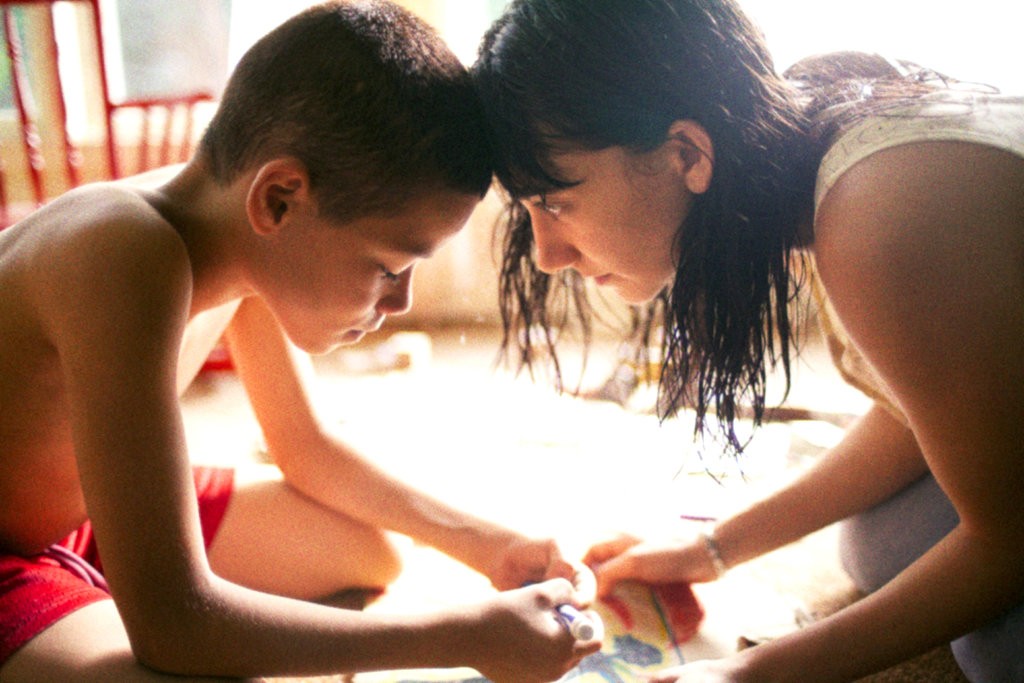We the Animals
by Aliya Jones
Image via IMDB
In the middle of the film We the Animals, Paps is fired from his job. His three sons, Jonah (played by Evan Rosado), Joel (Josiah Gabriel), and Manny (Isaiah Kristian), sit with him on the hard bed of their broken-down pickup truck as it’s towed down the highway, world-weary but barely adolescent. Then, rising from the ashes of their mourning, they start slapping a rhythm on the sides of the truck and shouting out silver linings.
“No more floor!” one shouts, referring to the brothers sleeping on the floor while Paps worked nights.
“No more coffee cup!” another yells, about a manifestation of Paps’ outrage and frustration.
“No more crying!” the last calls with glee, despite all the reasons they could weep.
Image via The LA Times
It’s this palpable feeling of freedom that leads the four of them to lean over the sides of the truck with their arms spread wide, feeling the wind rushing up against them as they’re carried home.
It’s a moment of pure, unadulterated happiness that comes after a moment of sobering realism; we’re forced to face the fact that Jonah, the youngest brother and the eyes through which we see this world, must find a way to grow up in an unstable situation. But director Jeremiah Zagar deftly pairs this tone of melancholic realism with scenes like the one in the pickup truck, bathing their lives in the glow of hope.
It’s a heavy film, one that deals with witnessing domestic abuse, emerging sexuality, being the other — all from the perspective of a ten-year-old. For a family that seems doomed to the cycle of poverty and abuse, happiness feels like a luxury that bubbles up at just the right time. Our source of hope is in Jonah, who we meet and know as innocent, though he is forced to mature over the course of the film. When he sneaks under his bed late at night to draw, his pictures are brought to life by animator Mark Samsonovich. It’s a fantasy world, one where his shaded-in people sprout wings, but it’s also a world consciously rooted in the reality we see play out on screen.
Image via Electric Literature
Zagar’s background in documentary filmmaking comes through as he shows us both the world where people walk on two feet and the world where Jonah’s wings are slowly emerging. Jonah’s perspective ties them together, so seamlessly integrated into the narrative that it’s only perceptible in the low camera angles and focus on Jonah’s eyes: big, expressive, and a striking color of blue. They remind us that while we are looking at his eyes, we’re also looking through his eyes. It calls into question how much of what we’re seeing through his mind is real. Even though Jonah’s animated drawings were clearly not part of the film’s reality, a part of me was convinced that they were as real as anything else just because they were his.
Much of the film is shot on 16mm, a brilliant stylistic choice that gives the story tangible texture and the nostalgic halo of childhood. The image feels raw and untouched, and that’s how Jonah’s family feels. Everything about the style lends the film air of isolation: the family lives in an area without many other houses around, keeping their heads down, as Jonah grows emotionally secluded from his otherwise tight-knit family.
Image via The NY Times
The actors inhabit their roles with phenomenal familiarity, as if they had lived together and developed their dynamics months prior to shooting. The three boys associate together not just as kids, but as brothers. They snicker to themselves as if everything is an inside joke. They bond in moments that become tender, as if they are realizing that they really do love each other despite all the bickering. When at one point, they lean over to each other and say, very seriously, “We are the power of God,” I was inclined to believe them.
By way of plot, not much happens. Instead, it’s a movie about becoming and understanding. Zagar is asking us to sit and live with this family for an hour and a half, but the film makes it easy to relate to a ten-year-old boy because Jonah is more than that characterization. He’s written with a level of universality that allows the audience to see themselves in him. We The Animals isn’t just about one moment in some kid’s life; it’s about being the other in a tight-knit group of the same. It’s about coming to terms with yourself, about living through hard things, but taking solace in the moments when you can bang your fists against your broken-down pickup truck.




